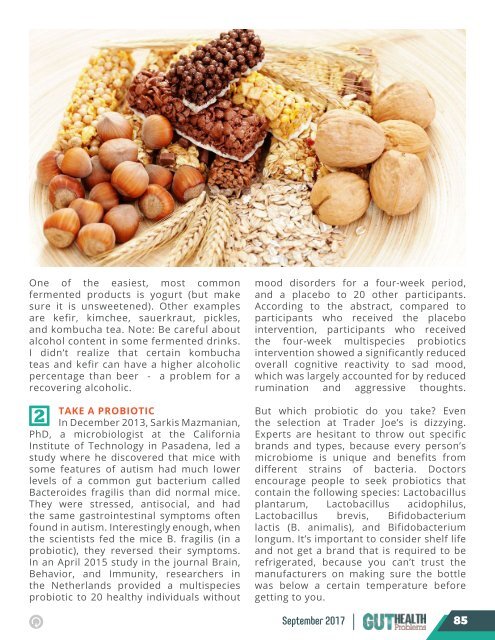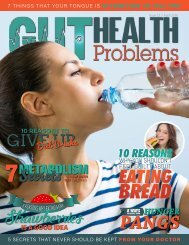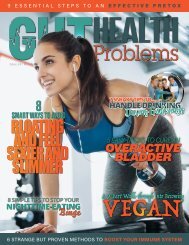Gut Health Problems - September 2017
In the eighth issue of Gut Health Problems, we have an overview of the vast benefits of probiotics, a checklist of foods rich in zinc, an intro to determining if you have fiber deficiency, and more. Intestinal discomfort, whether chronic or occasional, is something worth taking the time to prevent. And while we all have those foods that give us problems, you may actually be able to make a change that makes a bigger difference than you ever imagined.
In the eighth issue of Gut Health Problems, we have an overview of the vast benefits of probiotics, a checklist of foods rich in zinc, an intro to determining if you have fiber deficiency, and more. Intestinal discomfort, whether chronic or occasional, is something worth taking the time to prevent. And while we all have those foods that give us problems, you may actually be able to make a change that makes a bigger difference than you ever imagined.
Create successful ePaper yourself
Turn your PDF publications into a flip-book with our unique Google optimized e-Paper software.
One of the easiest, most common<br />
fermented products is yogurt (but make<br />
sure it is unsweetened). Other examples<br />
are kefir, kimchee, sauerkraut, pickles,<br />
and kombucha tea. Note: Be careful about<br />
alcohol content in some fermented drinks.<br />
I didn’t realize that certain kombucha<br />
teas and kefir can have a higher alcoholic<br />
percentage than beer - a problem for a<br />
recovering alcoholic.<br />
2<br />
TAKE A PROBIOTIC<br />
In December 2013, Sarkis Mazmanian,<br />
PhD, a microbiologist at the California<br />
Institute of Technology in Pasadena, led a<br />
study where he discovered that mice with<br />
some features of autism had much lower<br />
levels of a common gut bacterium called<br />
Bacteroides fragilis than did normal mice.<br />
They were stressed, antisocial, and had<br />
the same gastrointestinal symptoms often<br />
found in autism. Interestingly enough, when<br />
the scientists fed the mice B. fragilis (in a<br />
probiotic), they reversed their symptoms.<br />
In an April 2015 study in the journal Brain,<br />
Behavior, and Immunity, researchers in<br />
the Netherlands provided a multispecies<br />
probiotic to 20 healthy individuals without<br />
mood disorders for a four-week period,<br />
and a placebo to 20 other participants.<br />
According to the abstract, compared to<br />
participants who received the placebo<br />
intervention, participants who received<br />
the four-week multispecies probiotics<br />
intervention showed a significantly reduced<br />
overall cognitive reactivity to sad mood,<br />
which was largely accounted for by reduced<br />
rumination and aggressive thoughts.<br />
But which probiotic do you take? Even<br />
the selection at Trader Joe’s is dizzying.<br />
Experts are hesitant to throw out specific<br />
brands and types, because every person’s<br />
microbiome is unique and benefits from<br />
different strains of bacteria. Doctors<br />
encourage people to seek probiotics that<br />
contain the following species: Lactobacillus<br />
plantarum, Lactobacillus acidophilus,<br />
Lactobacillus brevis, Bifidobacterium<br />
lactis (B. animalis), and Bifidobacterium<br />
longum. It’s important to consider shelf life<br />
and not get a brand that is required to be<br />
refrigerated, because you can’t trust the<br />
manufacturers on making sure the bottle<br />
was below a certain temperature before<br />
getting to you.<br />
<strong>September</strong> <strong>2017</strong> 85

















